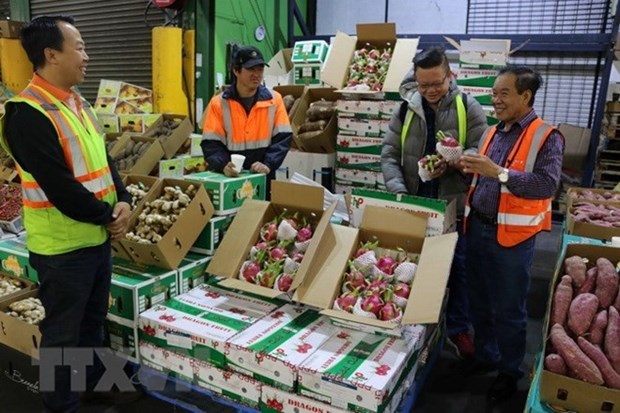Vietnam promotes farm produce exports to China via official channels
Understanding China’s technical regulations as well as sanitary and phytosanitary (SPS) requirements will help Vietnamese firms boost agricultural product exports to the neighbouring country via official channels to gain higher turnover, experts have recommended.
 Dragon fruit is among products allowed to enter Chinese market. (Photo: VNA)
Dragon fruit is among products allowed to enter Chinese market. (Photo: VNA)Hanoi (VNA) – Understanding China’s technical regulations as well as sanitary and phytosanitary (SPS) requirements will help Vietnamese firms boost agricultural product exports to the neighbouring country via official channels to gain higher turnover, experts have recommended.
At a seminar held in Hanoi on December 24, Deputy Director of the Ministry of Industry and Trade (MoIT)’s Trade Promotion Agency Doan Thi Thu Thuy said that Vietnam-China trade ties have enjoyed robust development in recent years, and China has been among largest trade partners of Vietnam thanks to their similarities in culture and customs.
As shipments to China have increased in recent years, Vietnam has narrowed down its trade gap with the neighbouring country, with trade deficit falling from 28 billion USD in 2016 to 22.7 billion USD in 2017, said Nguyen Huu Quan, a representative of the MoIT’s Department for Asian and African Markets.
Two-way trade during January-November hit 97.25 billion USD, a year-on-year surge of 16.07 percent, of which Vietnam exported 37.66 billion USD worth of products, up 21.7 percent from the same time last year.
According to Vietnamese Trade Counselor in China Dao Viet Anh, Vietnamese aquatic products, particularly frozen shrimps, tra fish, crab and octopus, among others, have been favoured in China.
The southwestern region of China has huge demand for cutlass fish while Yunnan province is also in need of seafood imports, Anh said, adding that but transportation and customs clearance pose challenges for Vietnamese firms to bring their products to the Chinese market.
Currently, Vietnamese dragon fruits, water melon, litchi, longan, mango, rambutan, banana and jackfruit have been allowed to enter China, and negotiations are underway for custard apple, passion fruit, pomelo, mangosteen, and rose apple, he added.
At the seminar, experts suggested establishing cooperation mechanisms among managers, businesses and farmers to ensure food safety in the value chain. They said that this will help exporters build rational promotion campaigns for both domestic and foreign markets.-VNA












